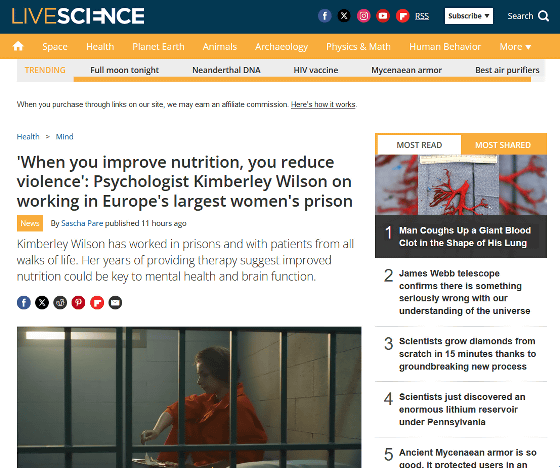Improved nutrition would reduce prison violence, say nutrition and psychology experts

'When you improve nutrition, you reduce violence': Psychologist Kimberley Wilson on working in Europe's largest women's prison | Live Science
https://www.livescience.com/health/mind/when-you-improve-nutrition-you-reduce-violence-psychologist-kimberley-wilson-on-working-in-europes-largest-women's-prison

Wilson says she learned about the links between diet, mental health and behavior during her career as a therapist at Holloway Prison. She has since opened a mental health clinic in London and published books such as ' How to Build a Healthy Brain: Reduce stress, anxiety and depression and future-proof your brain.'
Below is an excerpt from an interview between Live Science and Wilson, edited for clarity. The interviewer for Live Science is Sasha Pare (hereafter Pare).
Mr. Pare:
How did you get started focusing on food?
Mr. Wilson:
My first job after qualifying was working for a charity providing therapy to prisoners in prisons. At the time (2008-2013), women made up 6% of the UK prison population, but they accounted for around 50% of all self-harm incidents in prisons. Around that time, a study came out showing that giving prisoners supplements containing vitamins, minerals and fatty acids to improve their nutrition significantly reduced violent behaviour compared to a control group. This was a special study for me. I was thinking about safety and harm in my work in prisons, and here was a high-quality, gold-standard study demonstrating that a safe, accessible, low-cost, low-risk intervention could improve the wellbeing of not only prisoners but also staff.

Mr. Pare:
How have your peers and colleagues responded to the new information? Have you made any improvements to your nutrition while working in prisons?
Mr. Wilson:
I told my administrators and medical directors about this to see if we could do a small trial or offer supplements to the women most at risk, but we got no response. It's really interesting that people don't want to get involved in this issue. Subsequent studies from the US, UK, Holland and Singapore have shown the same results: improved nutrition reduces violence.
Mr. Pare:
So you were convinced by the data, even if your colleagues weren't. A few years later you left prison work to set up a practice in central London - what prompted you to incorporate nutrition into your practice?
Mr. Wilson:
I was doing my Masters in Nutrition, studying the role of nutrition in brain health and thinking about how a healthy brain improves mental health, so I started thinking about this issue with my clients and patients.

Mr. Pare:
Have you noticed an increased interest in the type of work you do - lifestyle-integrated therapy - in recent years?
Mr. Wilson:
'There's certainly more conversation about it, but also more skepticism about it. Is the brain somehow connected to the body? And does the quality or state of nutrition play a role in neurological symptoms and mental states? I think reintegrating the brain and the body is crucial for the future of mental health treatment and research.'
Mr. Pare:
When it comes to the body-brain connection, the “ gut-brain ” axis immediately comes to mind, but has there been any recent research demonstrating a link between nutrition and the brain?
Mr. Wilson:
When we look at the research on maternal diet and child brain health, we do see a clear link. For example, we know that iodine deficiency during pregnancy is the leading cause of preventable brain damage in children, which leads to lower IQs. We also know that a higher maternal intake of omega-3 fatty acids is associated with larger brain volume and better neuronal connectivity in babies.
In terms of the broader diet, 'ultra-processed' foods - pre-processed foods high in sugar, salt and fat - are low in nutrients. Since the brain is the hungriest organ in the body, the question arises as to whether people who consume a high amount of ultra-processed foods are getting enough nutrients to keep their brain functioning. The answer is no. People who consume a high amount of ultra-processed foods have higher rates of depression and anxiety , and experience faster cognitive decline.
Ultra-processed foods full of sugar and fat may affect not only your health but also your learning and memory - GIGAZINE

Mr. Pare:
How do you communicate this information to your clients?
Mr. Wilson:
I'm just presenting the evidence: 'There's evidence that if you eat a few more vegetables and fruits, you'll feel a little better. Why not give it a try?' Nutrition has a big impact on mood for some people and not for others, but it can't hurt to try to get more nutrition for a while.
The irony is that people go on social media to ask for instructions on what they should do, but I just say, 'Here's the information, use it however you like.' It's important for people to have access to information, but it's not a mandate.
Related Posts:







